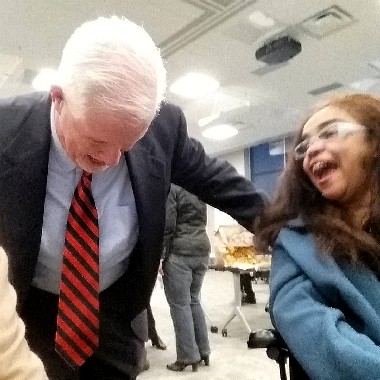Stemming The Tide Of Patient Accounting Personnel Defections
Posted by Mitch Mitchell on Jul 13, 2022
Even though this article is geared towards financial leaders in health care, the same ideas shared here for them can be modified for leaders in any business. When all is said and done, solutions are created and solved by leaders, whether or not they want to blame staff when problems arise.
 |
I once answered a question posed by a patient accounting director on a listserve. The question was one that many in health care leadership have to deal with, though maybe not because of the same circumstances.
She was having difficulties keeping people in the registration area. Because of the stress of the position, the low pay, and the ever increasing workload, her staff members were opting to move to other departments throughout the hospital or leave altogether. Her question was whether it would be a good idea to raise the pay level of the registration staff a dollar an hour to stem the tide of defections she was having to deal with.
I've always been one of those directors who believes registration personnel are often underpaid. I also believe two other things. One, no matter what level of stress shows up for registration personnel, their pressure will always be less than the pressure put onto billing personnel; it just feels more personal. Two, throwing money at a situation without trying to fix the other issues is a waste of time and, well, of course they're often grossly underpaid when compared to other employees throughout the hospital.
I acknowledge the pressure. Registration isn't anywhere close to the job it used to be when I was doing it, along with billing, back in 1984. Back then, obtaining patient information, as well as their billing information, was a process of putting on your best customer service skills and getting patients to feel like you were on their side while asking them many personal questions.
Today, most hospital billing systems depend on accurate information obtained upfront so bills can get out faster, with very few opportunities to correct the information on the back end. It's a much tougher position than it used to be, one that doesn't get the respect it deserves.
Then there are authorizations that need to be obtained for certain services for specific insurance companies. If this isn't handled by other departments, it increases both the pressure and the time it takes for patients to be processed. Authorizations are crucial to cash flow because without them hospitals end up writing off a lot of claims, which means they've given away free care. Sometimes they take the blame when the problem was not being able to get the proper information from the patients.
Many facilities have made the registration area a quasi-collections department at the same time, requiring them to ask patients how they intend to pay a bill if they don't have any insurance, asking them for payment of outstanding bills if there are balances left, asking them for co-payments, helping them start the process for either Medicaid or charity care. Combined, I feel that's way too much for what sometimes is the busiest area in the facility.
Those are only examples of the technical issues registration people have to deal with. The other thing they have to deal with is the respect of their co-workers throughout the facility. Registration people are treated as the least respected employees in a hospital; trust me, I've been there.
CEOs and other C-level leaders will walk by registration people and wonder why they're not working harder. If registration personnel are located in an ancillary area they're treated more like lackeys than professionals who've been trained to do a job.
I remember when I got to one facility that they had the ER registration personnel changing and making the beds in the emergency room, and other registration personnel would be called by ancillary and inpatient floors to retrieve medical records; I stopped that on day one.
Patients don't respect them because they see how they're treated by other employees throughout the facility, and they also hate signing all those forms. Even my little missive above about the differences between registration and billing personnel could be seen as a lack of respect for registration personnel, but nothing could be further from the truth.
 |
Many workers don't have the ability to resolve stress for themselves. Self imposed or circumstantial, it's the responsibility of you, the person to whom they report, to help them resolve some of their issues.
The first step is to communicate with them and the rest of the hospital the reality that they are professionals, that their work is valued, and that you support them in every way. There are some ways to do this, some very subtle, some quite overt.
In going back to the example above of what my registration personnel was having to go through, I'm going to document some things I did that got the results I wanted on the back end. The first two items I did almost immediately, which means the first day I was a director at the facility.
I met with the registration staff and told them they were no longer to go into the emergency room area without someone getting my permission first. This took the burden off of them and placed it squarely on me, and I used it to indicate to the emergency room personnel that registration did not work for them, but for me, and that any extra duties that may be required of them had to get my approval first.
On that same day, the ER registration personnel were told they were no longer responsible for cleaning rooms or making beds, going outside of the hospital to get patients from their cars or to wheel them into the hospital (they were untrained personnel and would have been liable for any incidences that occurred), and no longer retrieved medical records for the emergency room or any other departments in the hospital.
The second thing I did was write up a memo to every hospital director and administrator throughout the entire hospital explaining what the duties of the registration personnel were from that point forward, and that any extraneous requests for their time would have to be approved by me personally. I got mixed reviews on that one, but the administrator of the facility backed me up on that one and applauded me for taking the initiative in protecting my personnel. This move ended up giving me the opportunity to work with other department directors to help them out with some of their processes and charging techniques, as up until that point they'd never had any real cause to talk to the director of patient accounting.
The third thing I did was to promote someone to be the supervisor for registration, someone who only had to concentrate on their needs. One of the major issues we had in registration was that the first and second shift used to battle over their workload and there was a lack of communication. Once I hired this person I had her second shift go from noon to 8PM. This way, she could address the needs of those two shifts, get an idea of the workload of both shifts, and better determine what our true staffing needs were. We also had people working specific late evening shifts since we still have to cover the area 24/7, but it made things easier, and relieved a lot of pressure for everyone.
The final thing I did, which was the easy part, was set up a series of meetings so that I could personally meet with the registration staff, something I'd already set up with the billing staff. I set the meetings up so that we mixed personnel who worked on first and second shifts, making them confront each other on their issues and coming up with resolutions for some of those issues. This part wasn't necessarily a quick fix, but it established some ground rules for decorum between the two shifts and let them know that I was going to take their issues seriously, which sometimes meant they'd have to wait a couple of weeks or so for a good answer or positive result. Also, because they were a part of the decision making process, they felt included in what was going to happen.
What this did in the long run was end the exodus of staff leaving registration, and actually became, along with billing, a department that most other nonskilled workers throughout the hospital a popular area where people wanted to work. After solving the non monetary issues, then I tackled the pay scale issue. It was one more step that showed the employees that I was going to back them, that I valued the work they did, and that I was going to make sure everyone else throughout the hospital valued them also.
Some of these same steps can be used for every department throughout every hospital, and every other type of business. The goal is doing something positive so your staff feels important, and involving them we much as possible. Non skilled doesn't mean unimportant; sometimes we have to remind others of that fact.

